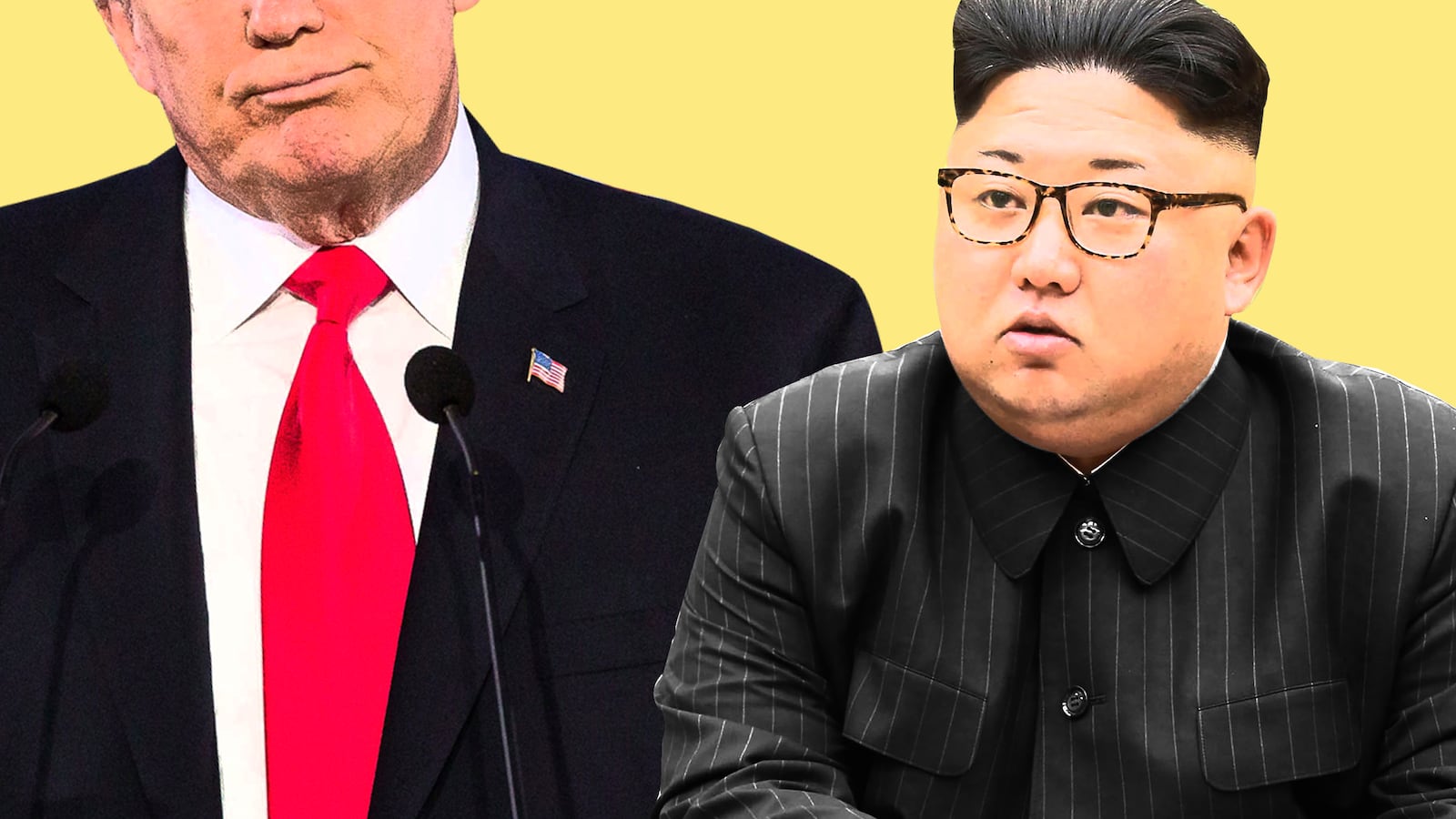It’s the furthest thing from a surprise that North Korean leader Kim Jong Un just invited Donald Trump for a summit. A venue has yet to be set and the agenda remains entirely up in the air, but Trump has accepted the invitation, according to an announcement Thursday evening by South Korea’s national security adviser, Chung Eui-yong. Trump will endeavor to meet Kim and “achieve permanent denuclearization” by the end of May 2018, according to Chung.
For more than two decades, successive North Korean leaders—first Kim Il Sung, then Kim Jong Il, and now Kim Jong Un—have sought to meet a sitting U.S. president as equals and enter comprehensive talks on the future of the Korean Peninsula. No sitting president has accepted; Jimmy Carter and Bill Clinton both went to North Korea, but after their terms had ended.
There was a good reason for this U.S. refusal to meet with any North Korean leader. Not only do the two countries have a deep history of mistrust and enmity, with Pyongyang not only regularly threatening nuclear war but also having defected from multiple diplomatic agreements, a one-on-one meeting with a U.S. president would serve as a major propaganda coup for the North.
Last year, when North Korea credibly demonstrated that it had mastered the technology required to throw thermonuclear payloads across the globe, to U.S. homeland targets, its envoys began referencing the idea of a “balance of power” with the United States. The idea was for Pyongyang to place itself in a stable nuclear deterrent relationship with the United States.
North Korea has long sought to be treated as an equal by Washington; nuclear weapons, in addition to the pragmatic survival and deterrence benefits they confer, undoubtedly also bring Pyongyang status. Kim hopes to convert that status into diplomatic capital, sitting down with Trump for a comprehensive discussion about the future of the Korean Peninsula, nuclear weapon state to nuclear weapon state.
It’s not clear that the Trump administration has internalized this. I’ve long supported governmental talks between the United States and North Korea. Before jumping straight ahead to a leaders’ summit, the two sides could have started at a lower level, with Trump perhaps announcing the creation of a presidential envoy for the Korean Peninsula.
There are plenty of lower-level, critical items for the two sides to address, including military-to-military communications. Here we have two nuclear states that the world witnessed exchanging threats in 2017 that don’t have a way to walk each other back from the brink. If there’s a no-brainer place to start, that would be it.
I fear too that by entering talks with their eyes set on the “denuclearization” objective, the Trump administration is setting itself up for disappointment and also predisposing itself to allow perfection to become the enemy of the good. If Kim is willing to enter a freeze in exchange for zero concessions from the international community on sanctions, the Trump administration should be open to an indefinite extension of that freeze, working eventually toward verifiable caps on North Korea’s arsenal. Everything to date suggests that’s simply not on the table.
For Kim, a meeting with Trump will be an unalloyed propaganda victory. Trump will assuredly not “achieve permanent denuclearization,” despite what he told Chung. Instead, Kim will be given the opportunity to stage-manage a photo-op with a U.S. president. The costs of a freeze in nuclear and ballistic missile testing for the next two months are relatively minor for North Korea compared to the benefits of a meeting with Trump.
In a normal world, too, there could be a serious opportunity in direct leader-level talks between the United States and North Korea, but Trump is far from a normal president. The United States is woefully lacking in subject matter expertise on the Korean Peninsula at the highest levels of government, with the State Department’s special representative for North Korea policy, Joseph Yun, having just stepped down last week and the post of ambassador to Seoul still vacant. Trump has the intelligence community behind him, but it’s doubtful that he’s capable of being successfully briefed.
A face-to-face meeting with Kim would require Trump to exercise cautious, measured engagement. He’d have to hear out what the North Korean leader has to say and know where the red lines lie. North Korea’s long-term play on the Korean Peninsula is to “decouple” the United States and South Korea.
During his campaign for the presidency, Trump showed more interest in sitting down for a “hamburger” with Kim than he did in the alliance with South Korea, complaining about the costs of maintaining a forward-based military presence there. Those instincts still live within Trump and are ripe for exploitation by North Korea, which has had plenty of time to study him.
Beyond the U.S.-North Korean dynamics of Thursday evening’s announcement, it bears stating how fundamentally strange the optics were of South Korean President Moon Jae-in’s national security adviser speaking to a gaggle of reporters outside the West Wing of the White House before a makeshift podium.
Chung was making a historic announcement that may end up having serious consequences for the Korean Peninsula, but no U.S. official was willing to stand by him. Chung even referenced the upcoming U.S.-South Korea Foal Eagle military exercises, which will see the mass mobilization of troops, underlining that Kim understood that they would have to go on at their normal scale.
Looking at the optics of the announcement, there’s little doubt that Moon’s government has taken the lead on the Peninsula, bringing shuttle diplomacy back. Chung and Suh Hoon, South Korea’s spy agency chief, became the first officials from any country to meet Kim and the president of the United States in the same week. Chung ended up reading out statements on behalf of both leaders—first on behalf of Kim in Seoul and now on behalf of Trump in Washington.
The biggest problem for the Moon government now would be if the North Koreans renege on the assurances that have been privately communicated to the South Korean envoys. Throughout this week’s historic headlines on the Korean Peninsula, it bears underlining that North Korea has yet to repeat the core points that Chung emphasized outside the West Wing: that it is ready to discuss denuclearization, that it will submit to a testing moratorium, and that it will tolerate U.S.-South Korea joint exercises.
Any one of those statements alone appearing in North Korean state media would be a coup, but all three would be remarkable and highly uncharacteristic of a normally belligerent regime. Remember too that Kim, despite being an autocrat, has a domestic audience to reassure: Regime elites in Pyongyang can’t feel as if their Dear Leader is planning to sell the country’s nuclear deterrent away.
It’s possible that whatever assurances South Korea received are assessed correctly to be credible, but Moon risks serious embarrassment. Adding to this, Trump has taken to Twitter to tout that “great progress” is being made—presumably based entirely on what South Korean officials have told him about North Korean intentions. What happens when that turns out to be wrong?
Events this week have been historic, but there are still plenty of ways this goes wrong for the United States and South Korea. The good news is that we’re back from the brink of a preemptive strike—or a “bloody nose” attack on North Korea—but this story doesn’t end with a denuclearized North Korea enjoying sanctions relief.
Far more likely is that the Trump administration sees its own failure with diplomatically engaging North Korea—like the Obama and Bush administrations did. Those administrations resorted to sanctions and eventually passing the hot potato issue of Korean Peninsula denuclearization to their successors. Trump may well find that he’s forced to do the same, after learning the hard way why North Korea is called the land of no good options.





